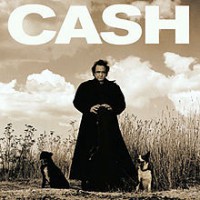
Johnny Cash
American Recordings (1994)
TomTrauma
By his own admission, Johnny Cash was invisible in the 1980s. His albums were not selling, and he found himself on the outside looking in at the Nashville establishment. He still had name recognition and a devoted following, but was mostly considered a nostalgia act. A whole generation was at risk of never experiencing the original American badass.
Cash was skeptical when approached by producer Rick Rubin about making a new album. Could a young producer known mostly for his work with hip hop and metal groups revive the career of an aging country legend? This unusual partnership would last for a decade until Cash's death in 2003, and produce, arguably, the finest work of Cash's remarkable career. Six excellent albums would come from this collaboration, starting with 1994's American Recordings .
The cover of the record is arresting, before you ever hear a note. Johnny Cash is standing at the edge of a field, under a cloudy sepia toned sky, flanked by two dogs. His hands are resting on the top of his almost invisible guitar case like a crystal ball. He's dressed in a long black cloak and looks like the reaper, death himself.
The album opens with two Cash originals. "Delia's Gone" is a dark song about killing an unfaithful lover, and sets the tone for what's to come. "Let the Train Blow the Whistle" continues a long tradition of songs involving trains, although Cash claimed to have had no special affinity for them. "The Beast in Me" is a contemplative track by one time new—waver Nick Lowe that explores the duality of man. "Drive On" is a more upbeat Cash original about the Vietnam experience. "Why Me Lord" is a song by fellow Highwaymen member Kris Kristofferson. Cash asks God why he has been so good to him when he's been so bad. "Thirteen" is another dark track, written by punk/metal legend Glenn Danzig. The Prince of Darkness wrote a song for The Man in Black. It almost makes your head explode, and is one of the record's many highlights.
"Oh, Bury Me Not" is a traditional sounding country—western song. "Bird on a Wire" is a melancholy track by acclaimed songwriter Leonard Cohen. "Tennessee Stud" is the first of two songs recorded live at LA's Viper Room. "Down There By the Train" is by another legendary songwriter, Tom Waits. In this case, the train being a metaphor for deliverance. "Redemption" is a Cash original that speaks to his deep religious faith. The message of blood as a means for atonement is powerful when delivered with such sincerity. "Like a Soldier" gives Cash a chance to look back at his life and be grateful. The album ends with "The Man Who Couldn't Cry" by Loudon Wainwright lll. It is a song in the grand storytelling tradition, and a perfect conclusion.
Part of the magic of this record is its simplicity. It is acoustic guitar and Johnny Cash's Earth—shaking voice, that's it. Every song is good, and there's enough variety to keep things interesting. It is mostly folk with elements of country and gospel, delivered with a rock and roll attitude. American Recordings also has a universal appeal. It is beloved by punkers, headbangers, hillbillies and grandpas. I'm confident that many of our recent punks gone acoustic acts spent a lot of time listening to the Cash/Rubin albums. They reminded us that acoustic music does not have to be easy listening. The world is very fortunate that Rick Rubin was able to coax so much more amazing music out of Johnny Cash. This may be the greatest Americana record ever made.